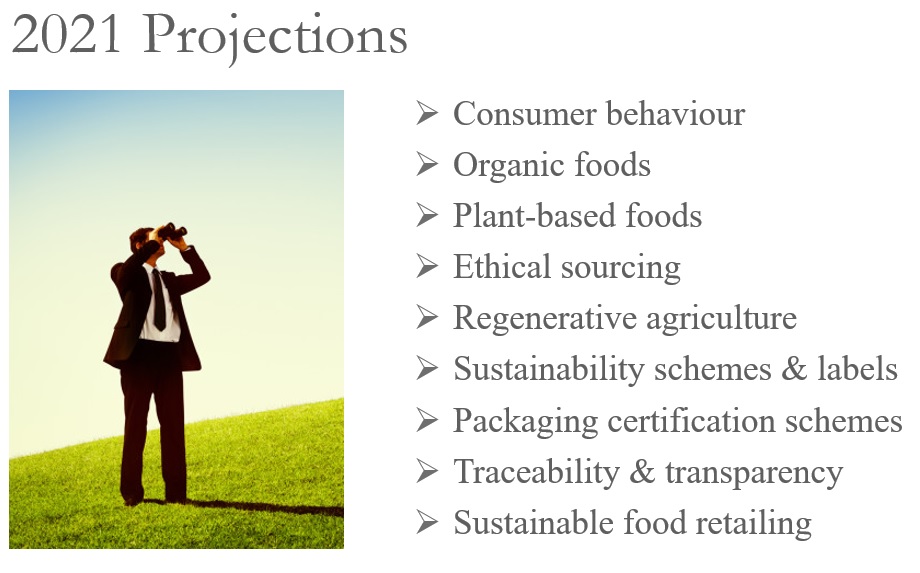 As the coronavirus pandemic continues into 2021, Ecovia Intelligence gives its predictions for sustainable foods for the year ahead…
As the coronavirus pandemic continues into 2021, Ecovia Intelligence gives its predictions for sustainable foods for the year ahead…
> Consumer behaviour. The pandemic has elevated consumer interest in health & wellness products. Demand for organic foods, plant-based products, nutritional supplements and natural remedies is expected to continue to rise as consumers look to increase their personal immunity.
> Organic foods. Consumers are turning to organic products during the pandemic as they are considered healthier and more nutritious than conventional foods. Initially stemming from Europe and North America, organic food sales are now increasing at a higher rate in other regions. Asia is showing a spike in demand; its share of global sales is projected to approach 10% in 2021.
> Plant-based foods. The surge in popularity of plant-based foods is expected to continue. The market share of plant drinks and meat alternatives will continue to rise in Europe and North America, whereas new products will be launched especially for the Asia and Latin American markets. Companies to watch include OmniMeat, Eat Just, and Beyond Meat.
> Ethical sourcing. There is growing interest in ethical sourcing from food companies and retailers. Some will adopt established certification schemes, whilst others will develop in-house schemes. Starbucks, Mondelez Foods, and Barilla are some of the companies leading with their in-house ethical sourcing programmes.
> Regenerative agriculture. More farmers and food producers are expected to embrace regenerative agriculture, considered the most sustainable form of farming. Adoption rates of the Regenerative Organic Certified scheme is likely to increase in 2021. Tablas Creek Vineyard, Navitas Organics, Nature’s Path, and Patagonia Provisions are some of the early adopters.
> Sustainability schemes and labels. The proliferation in number of sustainability schemes and ethical labels is envisaged to continue. Most developments are expected in North America where the Non-GMO Project and Glyphosate Residue Free labels are already making headway. Some of the ones to watch in 2021 include The Upcycling Food standard, Sustainable Rice Platform Verified scheme, and Sustainable Coconut Roundtable.
> Packaging certification schemes. Growing consumer opposition to single-use plastics is encouraging food & beverage companies to move to sustainable packaging materials. Expect to see greater interest in new certification schemes, such as Plastic Neutral (repurpose Global) and Plastic Free (A Plastic Planet).
> Traceability & transparency. The move towards providing transparency and traceability in raw material supply chains is gaining pace. More food and ingredient firms are predicted to invest in food traceability tools this year. The adoption rate of blockchain technology is predicted to rise. Carrefour, Albert Heijn, Walmart, and Albertsons are some of the food retailers already using blockchain.
> Sustainable food retailing. Online sales will continue to ‘eat into’ physical retailers’ share of sustainable food sales during the pandemic. New sustainable food retailers will open this year, with some specialising in vegan and plant-based foods. For instance, Hong Kong-based Green Common has just opened its first Singapore store. Others will focus on zero waste or refillable packaging like TerraCycle’s Loop shopping platform. Initially launched in the US, the e-commerce shopping platform has expanded to France, and the UK; it will be launched in Canada, Australia and Japan this year.
We cover such developments at the Sustainable Foods Summit. More details are on the website.
Posted: January 21st 2021
For permission to publish our research insights, please contact our media department

